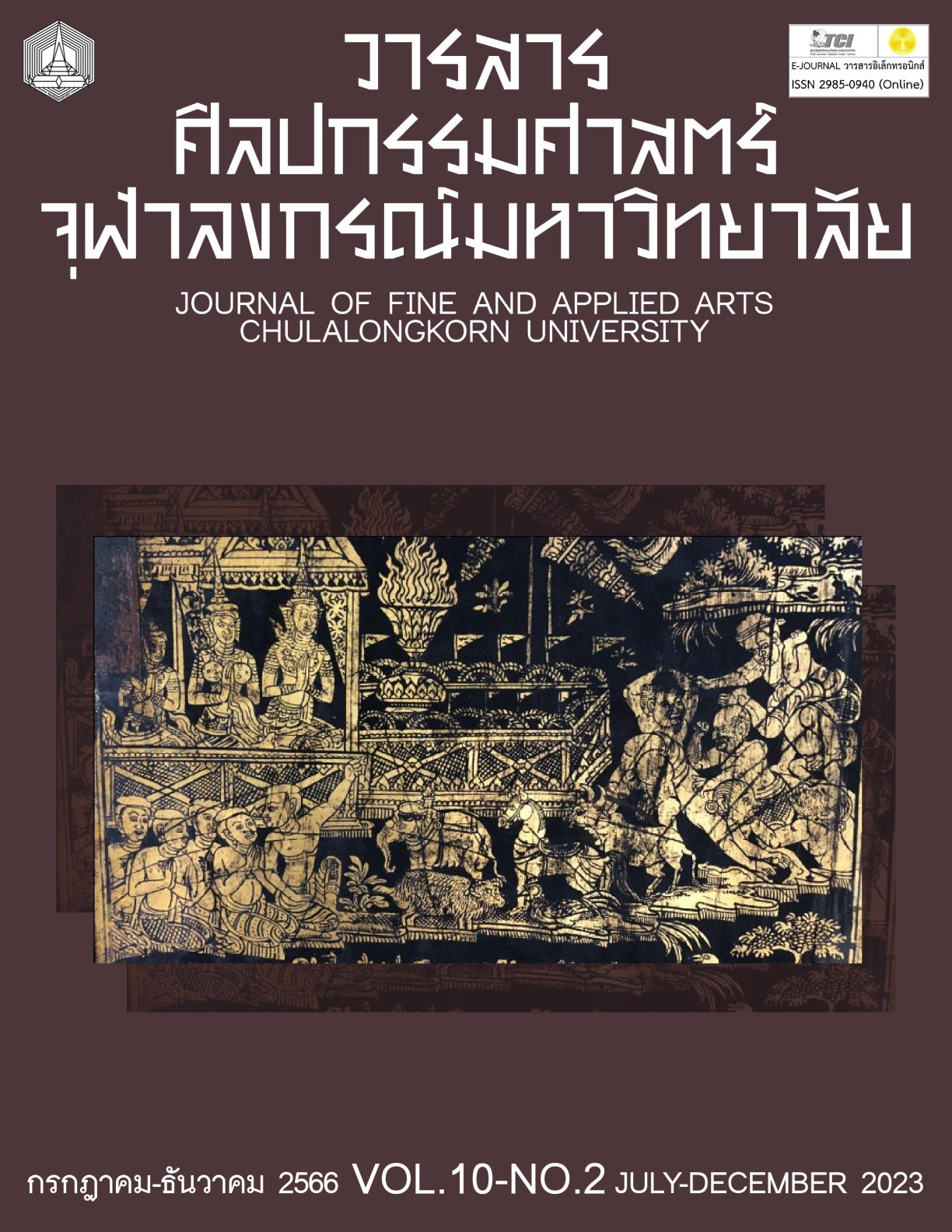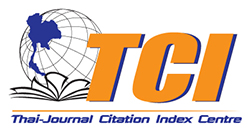DEVELOPMENT OF DRAMA ACTIVITIES FOR ONLINE GAMES LITERACY IN THE 21ST CENTURY
Keywords:
Theatrical Activity, Game Literacy Skills in the 21 Century, Drama Role PlayAbstract
The objective of this dissertation was to study: (1) develop theatrical activities to enhance online game literacy in the 21st century; (2) to compare the 21st century online game literacy skills of students in Grades Four to Six at Thonburi Rajabhat University Demonstration School in Samut Prakan, before and after participating in theatrical activities. The samples used in the research selected specific screenings from the Game Addiction Screening Test (GAST), as developed by the Rajnagarin Institute of Child and Adolescent Mental Health of the Department of Mental Health Ministry of Health for 20 students in Grades Four to Six at Thonburi Rajabhat University Demonstration School in Samut Prakan, who had problems with online gaming addiction. The methodology consisted of a process of theatrical activity to strengthen online game literacy in the 21st century and an online game literacy test from the sample, using standard deviation and t-test statistics.
The results of the study found the following: (1) designing theatrical activities to strengthen the literacy of online games in the 21st century. All of the activities encouraged proper knowledge of online gaming. The duration of the study was five weeks and two times at 60 minutes each, a total of 10 times. They can discern the advantages and disadvantages of playing online games and immunize children from being deceived, and they can also use their judgment regarding playing games; (2) the results of measuring online game literacy skills in the 21st century required all three skills: accessibility, analytical, and assessment skills, and the use of online game literacy skills for theatrical activities. It was based on pre-and-post-theatrical activities analyzed with t-test statistics. It was found that the pre-activity access skills had an average of 1.150, the post-activity had an average of 4.60, the pre-activity analytical skills had an average of 1.85, a post-activity score of 10.400, pre-activity assessment skills of 0.95 after activities at 3.55, and the use of online game literacy skills created drama before the activity at 3.90 and after the activity at 18.50. Based on the online game literacy skills in the 21st century, it was found that after all activities the score was statistically significant at 0.05
References
Biggins, Usa. “Creating Virtual Community in Online Games and Online Media Addiction Behavior among Youths in Bangkok.” Suthiparitat Journal 23 (May-August 2009): 7-2.
อุษา บิ้กกิ้นส์. “การสร้างชุมชนเสมือนจริงในเกมออนไลน์กับพฤติกรรมการติดสื่อออนไลน์ของเยาวชนในเขตกรุงเทพมหานคร.” วารสารสุทธิปริทัศน์ ปีที่ 23 (พฤษภาคม-สิงหาคม 2552): 7-2.
Chulasamphan. “Surveying the situation of children addicted to online games in Bangkok, almost 30% are addicted. It negatively affects learning and health.” Chulasamphan Journal (1992): 6.
จุฬาสัมพันธ์. “สำรวจสถานการณ์ปัญหาเด็กติดเกมออนไลน์ในกรุงเทพฯ เกือบ 30% เข้าข่ายเสพติดส่งผลเสียต่อการเรียนและสุขภาพ.” วารสารจุฬาสัมพันธ์ (2535): 6.
Damrung, Pornrat. Drama for youth. 2nd edition. Bangkok: Chulalongkorn University Press, 2007.
พรรัตน์ ดำรุง. การละครสำหรับเยาวชน. พิมพ์ครั้งที่ 2. กรุงเทพฯ : สำนักพิมพ์แห่งจุฬาลงกรณ์มหาวิทยาลัย, 2550.
Garuratana, Paranee. Acting Media and Child Development. Bangkok: Srinakharinwirot University, 1983.
ภรณี ครุุรัตนะ. สื่อการแสดงกับการพัฒนาเด็ก. กรุงเทพฯ : มหาวิทยาลัยศรีนครินทรวิโรฒ, 2526.
Ketuman, Phanom. “Adolescent Behavior Problems.” http://www.psyclin.co.th/new_page_56.htm.
พนม เกตุมาน. “ปัญหาพฤติกรรมวัยรุ่น.” http://www.psyclin.co.th/new_page_56.htm.
Khaemanee, Thitana. Science of teaching: body of knowledge for effective learning process management. 2nd edition. Bangkok: Chulalongkorn University Press, 2007.
ทิศนา แขมมณี. ศาสตร์การสอน : องค์ความรู้ เพื่อการจัดการกระบวนการเรียนรู้ที่มีประสิทธิภาพ. พิมพ์ครั้งที่ 2. กรุงเทพฯ : โรงพิมพ์แห่งจุฬาลงกรณ์มหาวิทยาลัย, 2550.
Kleechaya, Phanom. “Digital media literacy and teaching guidelines for media literacy digital for high school students in Thailand.” Research Report, Chulalongkorn University, 2017.
พนม คลี่ฉายา. “การใช้งานความเสี่ยงการรู้เท่าทันสื่อดิจิทัล และแนวทางการสอนเพื่อการรู้เท่าทันสื่อดิจิทัล สำหรับนักเรียนมัธยมศึกษาในประเทศไทย.” รายงานการวิจัย, จุฬาลงกรณ์มหาวิทยาลัย, 2560.
Lienyang, Thanyawanan. “A Study of Causal and Effectiveness Factors of a Behavioral Enhancing Program. playing games online appropriately for junior high school students.” PhD diss., Srinakharinwirot University, 2018.
ธันยวนันฐ์ เลียนอย่าง. “การศึกษาปัจจัยเชิงสาเหตุและประสิทธิผลของโปรแกรมเสริมสร้างพฤติกรรมการเล่นเกมออนไลน์ อย่างเหมาะสมของนักเรียนชั้นมัธยมศึกษาตอนต้น.” วิทยานิพนธ์ระดับปรัชญาดุษฎีบัณฑิต, มหาวิทยาลัยศรีนครินทรวิโรฒ, 2561.
Ponglertwuthi, Kannika. “The results of storytelling activities. Creative drama on self-discipline of early childhood children.” Master thesis, Srinakharinwirot University, 2004.
กรรณิการ์ พงศ์เลิศวุฒิ. “ผลของการจัดกิจกรรมเล่านิทานประกอบละครสร้างสรรค์ต่อความมีวินัยในตนเองของเด็กปฐมวัย.” วิทยานิพนธ์ระดับปริญญามหาบัณฑิต, มหาวิทยาลัยศรีนครินทรวิโรฒ, 2547.
Ratanawarang, Wannarat. “Playing Online Games of Students and Family Relationships.” Research Report, Srinakharinwirot University, 2004.
วรรณรัตน์ รัตนวรางค์. “การเล่นเกมออนไลน์ของเด็กนักเรียนกับความสัมพันธ์ในครอบครัว.” รายงานการวิจัย, มหาวิทยาลัยศรีนครินทรวิโรฒ, 2547.
Sareerasart, Wanvisa. “The Relationships among Social Situations and Psychological Immunity to Internet Behavior Focusing on Safety and Usefulness of Female Students in High Schools with or without Internet Safety Project.” Master thesis, Srinakharinwirot University, 2011.
วันวิสา สรีระศาสตร์. “ปัจจัยเชิงสาเหตุด้านสถานการณ์ทางสังคม และการมีภูมิคุ้มกันทางจิตที่เกี่ยวข้องกับพฤติกรรมการใช้อินเทอร์เน็ตอย่างสร้างสรรค์และปลอดภัยของนักเรียนหญิงระดับมัธยมศึกษาในโรงเรียนที่เข้าร่วมและไม่เข้าร่วมโครงการส่งเสริมการใช้อินเทอร์เน็ตอย่างสร้างสรรค์และปลอดภัย.” วิทยานิพนธ์ระดับปริญญามหาบัณฑิต, มหาวิทยาลัยศรีนครินทรวิโรฒ, 2554.
Sitthisuea, Nat and Kusuma Teppharak. “The use of creative drama to develop media literacy skills.” Academic Journal for the Humanities and Social Sciences Dhonburi Rajabhat University 3, no. 2 (May-August 2020): 37-48.
นัทธ สิทธิเสือ และ กุสุมา เทพรักษ์“การใช้ละครสร้างสรรค์เพื่อพัฒนาทักษะการรู้เท่าทันสื่อ.” วารสารวิชาการมนุษยศาสตร์และสังคมศาสตร์ มหาวิทยาลัยราชภัฏธนบุรี ปีที่ 3, ฉบับที่ 2 (พฤษภาคม-สิงหาคม 2563): 37-48.
Suriyakan, Kittima. “Building Positive Discipline.” http://www.craniofacial.or.th/positive-discipline.php.
กิตติมา สุริยกานต์. “การสร้างวินัยเชิงบวก.” http://www.craniofacial.or.th/positive-discipline.php.
Witsanupongporn, Supaknit. “Behavior of playing online games affecting learning among secondary school students. at the beginning.” Master thesis, Burapha University, 2009.
ศุภัคนิจ วิษณุพงษ์พร. “พฤติกรรมการเล่นเกมออนไลน์ที่ส่งผลต่อการเรียนของเด็กนักเรียนมัธยมศึกษาตอนต้น.” วิทยานิพนธ์ระดับปริญญามหาบัณฑิต, มหาวิทยาลัยบูรพา, 2552.
Yenjabok, Pornthip. Decoding secret thoughts for media literacy. Bangkok: Offset Creation Co., 2009.
พรทิพย์ เย็นจะบก. ถอดรหัส ลับความคิด เพื่อการรู้เท่าทันสื่อ. กรุงเทพฯ : ออฟเซ็ทครีเอชั่น จำกัด, 2552.
Downloads
Published
Issue
Section
License
Copyright (c) 2023 NICHAPA CHANLAR , PORAWAN PATTAYANON , NOPPADOL INCHAN

This work is licensed under a Creative Commons Attribution-NonCommercial-NoDerivatives 4.0 International License.
ลิขสิทธิ์ของบทความเป็นของเจ้าของบทความ บทความที่ได้รับการตีพิมพ์ถือเป็นทัศนะของผู้เขียน
กองบรรณาธิการไม่จำเป็นต้องเห็นด้วยและไม่รับผิดชอบต่อบทความนั้น






